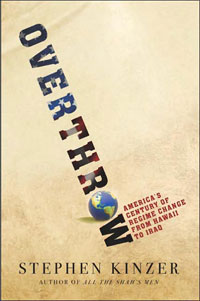Book Notes
 Stephen Kinzer, Overthrow: America's Century of Regime Change from Hawaii to Iraq (New York: Times Books, 2006), 385pp.
Stephen Kinzer, Overthrow: America's Century of Regime Change from Hawaii to Iraq (New York: Times Books, 2006), 385pp.
Even though Saddam Hussein distinguished himself as one of history's most ruthless dictators, many Americans expressed surprise that the United States preemptively invaded a sovereign nation to depose a head of state. I know that I did. But there was nothing unusual about American regime change, according to Stephen Kinzer. Only historical ignorance, amnesia, or patriotic naivete could allow someone like me to enjoy such a pleasant myth. Kinzer has reported from more than fifty countries as a foreign correspondent, and in this book he examines the fourteen times in the last century that the United States has toppled foreign governments:
* Hawaii (1893)
* Cuba (1898)
* Puerto Rico (1898)
* Philippines (1902)
* Nicaragua (1910)
* Honduras (1911)
* Iran (1953)
* Guatemala (1954)
* Vietnam (1963)
* Chile (1973)
* Grenada (1983)
* Panama (1989)
* Afghanistan (2001)
* Iraq (2003)
Specialists will debate the complex nuances of outright coups, covert activities, mixed motives, and historical consequences, but by giving us the "big picture" Kinzer reminds us that America's geopolitics is hardly benign or altruistic. "No nation in modern history," he writes, "has done this so often, in so many places so far from its own shores."
America has deposed foreign governments for many reasons. We have claimed to civilize others, Christianize them, protect them, and liberate them. We have also ousted presidents and prime ministers to guard economic interests (including those of corporations like United Fruit and ITT), control another country's natural resources (especially when they had the audacity to try to nationalize them for their own citizens), maintain and spread our power, and combat enemy ideologies. We have employed Machiavellian means to accomplish regime change, including bold lies, doing the exact opposite of what we promised, ignoring international law, media censorship, terror, torture, rape, funneling hundreds of millions of dollars to rebel causes, and propaganda. Some of what we have done feels good and right, like ridding Panama of Noriega. But a major theme of Kinzer's book is the law of unintended consequences. Invading other countries has almost always radicalized extreme groups, fanned the flames of nationalism, and fomented anti-Americanism that has destabilized countries rather than strengthened them. Invading others, in fact, has more often than not weakened our own country. Since no country can resist our will to power, we have thus often been the victim of our own "catastrophic success."


